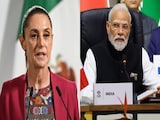Elections to choose the next President of India will be held on July 18, the Election Commission announced today. The counting, if there is a need, will be held on July 21. The new President will take oath on July 25, the Commission said.
There has been speculation that President Ram Nath Kovind will not get a second term in office and the new candidate is likely to be announced soon. So far, only first president Rajendra Prasad was elected twice.
While government sources earlier indicated that a consensus candidate will be preferred, the chances of an election are high. The opposition is likely to put up a joint candidate but a consensus on that too, is not likely to be easy, given the subtle shift in power structure following the Congress's increasingly poor performance in most elections since 2014.
President Kovind's term ends on July 24. In 2017, the BJP had picked Mr Kovind, a Dalit and then Governor of Bihar, for the country's highest office, causing a divide in the opposition camp.
Following the election, held on July 21, Mr Kovind became the 14th President of India, beating opposition candidate Meira Kumar -- the former Speaker of the Lok Sabha -- with 65.65 per cent of the total votes which totalled 702,044 electoral college votes.
The President is elected by the members of the electoral college, comprising elected members of both houses of Parliament and legislative assemblies of states as well as the National Capital Territory of Delhi and the Union Territory of Puducherry.
Altogether, 776 parliamentarians and 4,033 legislators will vote in the election. The total vote value of legislators is 5,43,231 and that of MPs -- 5,43,200. So there will be 4,809 electors with a vote value of 10,86,431.
The Election Commission's announcement comes a day before elections are held for 57 vacant seats of Rajya Sabha. The seats are spread across 15 states.
The Rajya Sabha polls will be crucial for the Presidential election – with Jammu and Kashmir being under President's Rule and three other states – Rajasthan, Chhattisgarh and Tamil Nadu – being under opposition control.
In 2017, Rajasthan and Chhattisgarh were under BJP rule and in Tamil Nadu, the legislators of the ruling AIADMK had voted for Mr Kovind. There had also been largescale cross voting, with some MLAs of the Congress and a few other parties bolstering the Prime Minister's choice.















